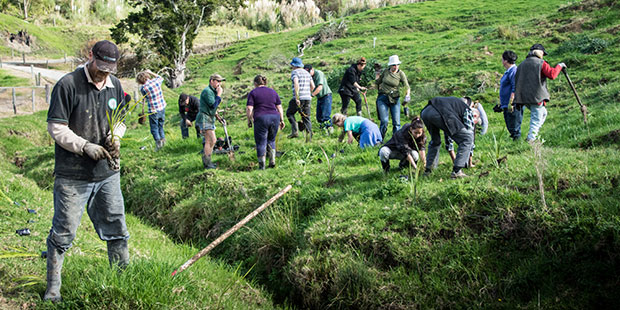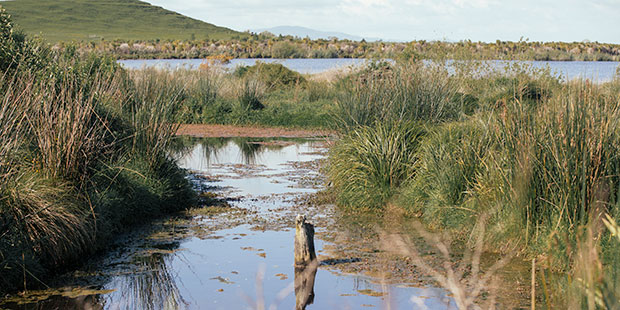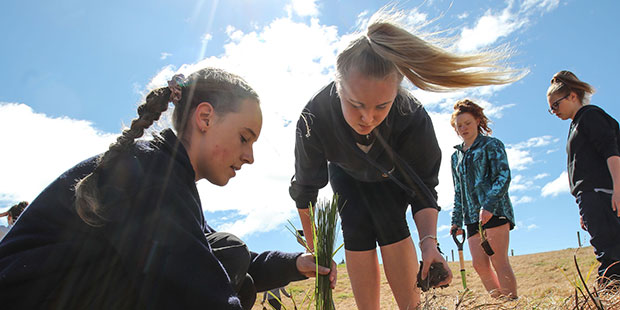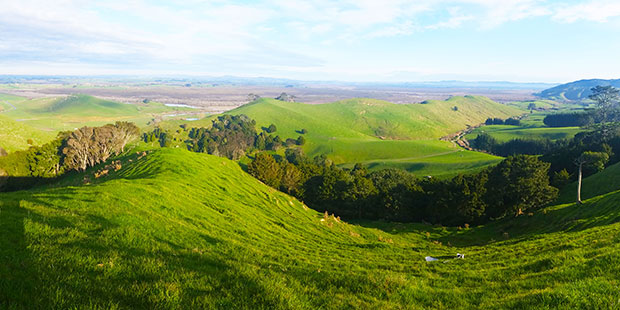When carrots are better than sticks
A planting scheme helping farmers in Northland is reaping benefits with "how to do it" approach.


“What we offer is the carrot,” says the secretary of the Otamatea HarbourCare Society, Mark Vincent, well aware that many farmers believe they are being subject to “a stick” when it comes to environmental improvements.
That carrot has involved just over 24,500 plants being supplied by the society to farmers in lower Northland around the Kaipara Harbour in the past year (and approaching 100,000 over five years), with around half of those going to dairy farmers. All but 2500 were grown in the society’s own nursery, sited on Mark’s small block and run with volunteer labour.
He worked for Kaipara Council, its representative on the Integrated Kaipara Harbour Management Group (IKHMG), for a time – which performed a valuable function with a number of flagship sites where farmers could see for themselves the practical results of landowner decisions to undertake environmental improvements, to reverse the damage done to the harbour and marine life by run-off from the surrounding countryside.

Mark Vincent and his grandchildren. Photo / Supplied.
Mark Vincent and his grandchildren. Photo / Supplied.
So when he was made redundant seven years ago, he decided to re-purpose a polyhouse on his block to support landowners fencing and planting riparian and eroded areas. The Otamatea HarbourCare Society was formed, committed to reversing the harbour’s degradation.
Vincent’s shed was used to grow sandersonia but he set it up for growing manuka seedlings. In his first year he grew 300 with another 1700 contributed by Reconnecting Northland, an ecological programme which focuses on the wellbeing of both people and land. He set up a Facebook page for the society and put out the call for volunteers for regular working bees.
“We’re in the nursery for two hours regardless of how much there is to do,” he says. “Then we have morning tea for an hour and a half.”
Many of the volunteers are retirees who have recently moved into the area, with a recent calculation he did (excluding himself) showing an average age of over 79.
Field days have been held in the past to plant up specific areas on different farms – and there’s strong involvement from local primary and secondary schools with Matakohe Primary School first cab off the rank and still going strong. Their first task was to plant along the Ruatuna Stream, on the farm once owned by former Prime Minister Gordon Coates.
“They’ve been back there twice in the last four years, so can see where they’ve been,” Vincent says. “It’s remarkable how many plants have survived the summer drought.”
The nursery now produces flaxes, cabbage trees, karaka, koromiko and karamu. Sedges have more recently been bought in to be planted close to waterways where other species might be flooded out.
“Wetland plants are the ones we’d like to have more of, because that’s the direction of travel,” he said.

Mark Vincent. Photo / Supplied.
Mark Vincent. Photo / Supplied.
While there were plants left in the nursery in October last year when it was getting late for planting them out, it’s been a very different story this year – with demand exceeding supply. He puts that down to some farmers previously taking a wait-and-see approach to the Government’s freshwater reforms.
“Farmers feel that everything is coming at them, so the planting plan has to be manageable over several years,” he said.
“The key is a farm environment plan where it’s critical to have the right people skills in drawing it up. Then they have ownership of that – it’s not something that’s imposed on them.”
While most planting is carried out along waterways, each site is looked at carefully to determine priorities, which can include retiring unproductive land or filling in areas where a block of bush has already been fenced off.
He cautions that planting isn’t the answer in every situation and the expertise of a skilled adviser is needed to look at other possible options such as bridging, changing drainage or updating farm effluent systems.
In July last year, the society signed a contract with Fonterra to supply 10,000 plants for shareholders’ farms bordering the Wairau River which runs from the southern foot of the Brynderwyn Hills to Maungatoroto.
With Covid-19 and then farmers being busy during calving, Vincent says that number won’t quite be met by the contract planter he helps. But the dairy company has already paid for another 5000 plants to go into the area.

Mark Vincent with Kathryne Easton. Photo / Supplied.
Mark Vincent with Kathryne Easton. Photo / Supplied.
Individual farmers are already seeing benefits such as the reduced risk of cows getting stuck in boggy, unfenced areas on their farms or escaping to the neighbours and needing to be retrieved.
The society’s slogan is “A healthy harbour alongside productive land” and, while Vincent says water quality improvements haven’t been scientifically proven as a result of the planting it’s so far carried out, anecdotally better fish catches are being reported in the harbour.
“And that’s exactly the kind of thing we’re hoping to achieve.”
to note only - changed to past tense. Believe it important this para is left in to give context. Has been altered to past tense so it has a historical element but think it should remain in that form.
to note only: Paul feels the quote is quite clear and the suggested alteration less so. As it is a direct quote, they are loath to change it without more reason than stated, particularly as its meaning is clear. Have let it be.






